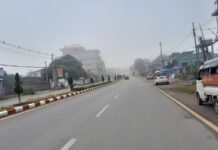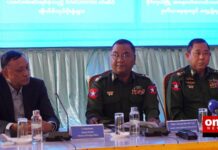It seems the new Nationwide Ceasefire Agreement (NCA)-signatory New Mon State Party (NMSP), which has just joined the fray on February 13, is experiencing the same fate of obstruction and prohibition in holding public consultation meeting or national-level political dialogue like its counterparts, the Restoration Council of Shan State (RCSS) and Arakan Liberation Party (ALP). It is understood as a basic necessity in order to gather public opinion and inputs for the forthcoming third 21st Century Panglong Conference, scheduled to take place sometime in May of this year.
According to the Mon sources, NMSP Central Executive Committee member Naing Win Hla, who is also responsible for internal affairs, said that Tatmadaw’s South-Eastern Command authorities prohibited the holding of public consultation meeting, stating that it should be within the limit of 30 participants and not over 200, as planned by the NMSP.
Reportedly, on March 10, the NMSP was preparing to hold meeting, to clarify why it signed the NCA, discussion of future plans and to gather inputs, at its Thaton District Headquarters with the participation of some 200 people, involving political parties, civil society organizations and family members of the Mon Army. However, the meeting has been prohibited to take place by the Tatmadaw saying that the number was too much and that it can’t be allowed as it is more than 30 participants.
 Accordingly, Mon national-level political dialogue was planned in five places with about 250 participants each between March 10 to 27 by the NMSP, which are now being shelved indefinitely.
Accordingly, Mon national-level political dialogue was planned in five places with about 250 participants each between March 10 to 27 by the NMSP, which are now being shelved indefinitely.
At the moment Naing Win Hla said: “We have tabled and explained the situation of the meeting postponement due to the complaint of high participant numbers to the Peace Commission (PC) and also the National Reconciliation and Peace Center (NRPC). And we are awaiting on how they would resolve the problem.”
Although openly irked by the situation, Naing Win Hla said they are determined to continue with the political negotiation adding: “We just signed the NCA so that we could enter the political negotiation meeting. Now within this month it has not happened according to our aspirations. And also the same is happening in other places. We still have a lot of groups that haven’t sign and I like to conclude that this could result in having less faith on the NCA.”
The RCSS spokesman Col Sai Nguen, whose organization also faced the same prohibited situation in Shan State regarding public consultation meetings said: “We see that we are entitled to hold free consultation meetings widely within our people’s areas. But the Tatmadaw sees it just the opposite. That’s why we are now trying to adjust the different views through unofficially meetings between the government, Tatmadaw and us.”
Regarding the NMSP problematic, Sai Nguen suggested that if bilateral agreement between itsself and the Tatmadaw couldn’t be reached, the way to proceed is through the Union Peace Dialogue Joint Committee (UPDJC) which is responsible for political dialogue and directing the whole peace process undertaking. And even if the UPDJC is unable to resolve the problem the NMSP should proceed to Joint Implementation Coordination Meeting (JICM) that is the highest organ that delegates the whole NCA-based peace process.
Aung Thu Nyein Director of the Institute for Strategy and Policy – Myanmar (ISP – Myanmar) analyses the situation clearer when he said: “The problem is that the Ethnic Armed Organizations (EAOs), government and the Tatmadaw don’t understand each other. The ethnic nationalities take is that comprehensive and wide consultation is needed in order to able to gather opinion and formulate position papers for the peace conferences; and they also want to do it repeatedly. But the government, especially the Tatmadaw, wants them to conduct such meetings with limitation on time and space.”
At the end of the day, the government and the Tatmadaw would need to consider if such a limited public consultation control mechanism meted out on the RCSS, ALP and NMSP would do any good to foster trust-building for eventual reconciliation and political settlement. And for all its trumpeting that the NCA-based approach is the jointly owned peace process, the powers that be needs to show broad-mindedness now and get rid of its angst that the ethnic population would be hatching ideas that are against it.
A degree of trust combined with calculated risk is the way to go for the government and the Tatmadaw. And to say the least, it is actually a low risk undertaking in agreeing to the ethnic public consultation meetings in the ethnic states, while the foreseeable political gains and an atmosphere of optimism could be tremendous.
Just imagine how such activities could stimulate trust-building and the potential of enviousness from the non-signatory EAOs that could usher them into the peace process.
Who knows, maybe taking a little calculated risk by trusting the ethnic nationalities would go a long way to empower the now stagnated peace process than just suspicion and total control in all their activities, which would only breed more animosity, distrust and derail the peace process altogether.












Leave a Comments